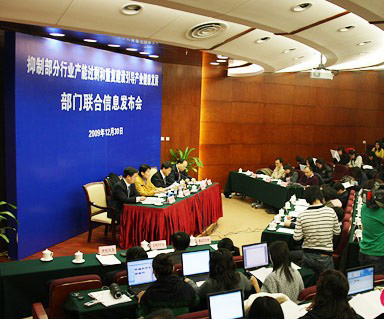- 0086(21)62671680
- 62671061
- sales@hyssgroup.com
- Language

China's top economic planners vowed Wednesday to keep cracking down on the coal chemical industry, in a bid to prevent waste and further the sustainable development of the industry.
"There's obvious over-development in the coal chemical sector. We must continue to constrain over-heating of the industry through ways like raising the market entry threshold and phasing out obsolete overcapacity," said Yuan Longhua, deputy director of the raw-materials department of the Ministry of Industry and Information Technology (MIIT) at a press conference.
Yuan said the MIIT would finish a draft for comments on entry conditions for synthesis ammonia producers in the first half of 2010.
The MIIT revised the calcium carbide industry entry criteria in 2007 and the coke industry entry criteria in 2008.
The capacity utilization rate of coke was only 80 percent in 2008, but another 30 million tons of capacity were added this year. Coke output so far this year has reached 380 million tons, compared with 330 million tons of demand, Li Ningning, deputy head of the department of industry with the National Development and Reform Commission, said.
China is short of oil and gas, but has redundant coal, he said. Technologies and equipment needed by the coal industry have been well developed and coal requires less investment to start with, Li added.
Traditional coal derivatives, mainly ammonia, methanol, coke and calcium carbide, are chemicals and energy products converted from coal.
These products can be used as fuel for electricity generation, but also as raw materials for substitutes of petrochemical products such as dimethyl ether, coal oil, olefins, natural gas and glycol.
The soaring price of crude oil is another reason for the rush to build new facilities for petrochemical products, though China hasn't been able to start large-scale construction at the moment, Li said.
The coal chemical products sector is resource intensive and highly polluting.
Besides toughening regulatory standards to restrict entry in the sector, the government will ban for three years new projects that simply enlarge capacity. Cutting outdated capacity has also been considered an efficient instrument to curb overcapacity.
"As of now, we have eliminated outdated coke capacity of 82.54 million tons and outdated calcium carbide capacity of 2.87 million tons," Yuan said.
Production overcapacity has been a big problem for several industries in China. The State Council issued guidelines in October to curb the expansion of six sectors including steel, cement, plate glass, the coal-chemical industry, polycrystalline silicon and wind power equipment.